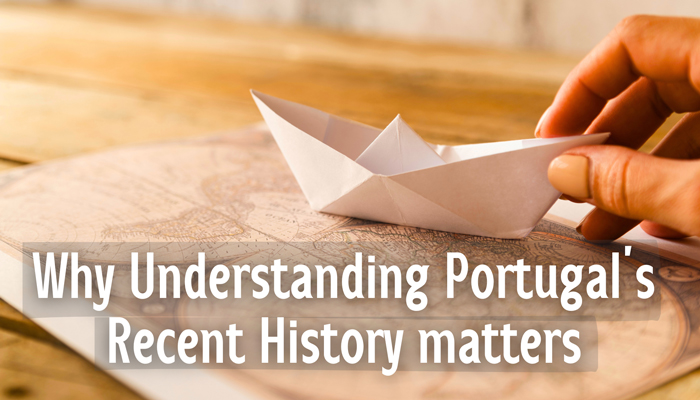Why Understanding Portugal’s Recent History Matters
Learning about the recent history of the country where one lives is fundamental to better understanding its culture, society, and identity. This knowledge helps residents appreciate local traditions, participate more fully in community life, and develop empathy for the historical experiences that shape contemporary realities. For students learning European Portuguese, familiarity with Portugal’s historical context significantly enriches their language studies and cultural integration.

Portugal in the 20th and 21st Centuries
1 – The Change of Regime: From Monarchy to Republic
At the beginning of the 20th century, Portugal was still a monarchy, meaning it had a king. However, many Portuguese citizens desired changes and a more modern government. On October 5th, 1910, a revolution took place in Lisbon, ending the monarchy and establishing a republic. On this day, the last king of Portugal, D. Manuel II, was forced to leave the country.
With the republic, Portugal began having a president instead of a king. The national flag and anthem were also changed, better representing the new era of freedom and democracy. However, the republic’s initial years were challenging, marked by frequent governmental changes, social and economic conflicts, and difficulty stabilizing the nation. This unstable period set the stage for another political regime: the Estado Novo, led by António de Oliveira Salazar.
2 – The Estado Novo and Salazar
In 1926, Portugal underwent another political shift, initiating an authoritarian regime known as Estado Novo. António de Oliveira Salazar led this regime, governing Portugal for nearly 40 years, from 1932 to 1968.
Salazar believed in a strong, highly organized government. Under the Estado Novo, individuals had limited freedom of expression, and democracy was suppressed. Newspapers, radio stations, and schools were controlled by the government to prevent criticism of the regime.
Although the Estado Novo provided political and financial stability, it severely restricted personal freedoms. Those opposing the government risked imprisonment or exile. The economy depended heavily on agriculture and Portugal’s colonies in Africa and Asia. The colonial war, beginning in the 1960s, significantly weakened the regime, setting the stage for the 1974 revolution.
3 – The Revolution of April 25, 1974
On April 25th, 1974, a crucial revolution known as the Carnation Revolution took place in Portugal, ending the Estado Novo regime and restoring democracy.
The revolution earned its name because people placed carnations (red flowers) into soldiers’ gun barrels, symbolizing the peaceful nature of the revolt. Initiated by military officers tired of colonial wars and eager for democracy, the revolution resulted in the release of political prisoners, the end of censorship, and paved the way for free elections.
After the revolution, Portugal transitioned into a democratic government, where people could vote freely and express their opinions without fear. The 25th of April is celebrated annually as a significant day for Portuguese freedom.
4 – Democratic Portugal and the European Union
Following the 1974 revolution, Portugal entered a new democratic phase. Portuguese citizens began freely electing their political leaders.
In 1986, Portugal joined the European Union, a community of European countries collaborating for peace, economic development, and citizen welfare. EU membership brought many benefits, including financial support to develop infrastructures like roads, hospitals, and schools. Additionally, Portuguese citizens gained the freedom to travel, study, or work in other EU countries.
Portugal adopted the euro in 2002, facilitating trade and travel. Today, Portugal is viewed as a modern European nation actively participating in economic, social, and cultural cooperation within Europe.
Portugal Today: Society and Culture
Portugal today is a modern, diverse, and dynamic country. Portuguese society is renowned for its hospitality, family values, and vibrant cultural traditions. Culturally, Portugal is celebrated for traditional music, notably Fado, recognized as a cultural heritage by UNESCO. Icons like Amália Rodrigues are significant symbols of this musical tradition.
Portugal’s gastronomy is famous worldwide, featuring dishes such as codfish, pastéis de nata, and high-quality olive oil. Today’s Portuguese society is increasingly diverse, attracting individuals from around the globe. The country also faces contemporary challenges, including environmental, technological, and social issues.
Tourism plays a vital role in Portugal’s economy and identity, with tourists attracted to its rich history, stunning landscapes, beaches, and vibrant cities.
Recommendation for Learners
For those interested in further exploring Portugal’s contemporary history and enhancing their listening comprehension skills in European Portuguese, I highly recommend the RTP series “Conta-me como foi”. This engaging series vividly portrays life in Portugal from the 1960s onwards, making it an excellent resource for language learners seeking to deepen their understanding of Portuguese culture and society.
Additionally, learners can download the free educational resource, História de Portugal para estudantes de português. This book, designed specifically for A2-B1 level learners, offers a clear and accessible overview of Portuguese history. It is an excellent complement for further understanding and practicing Portuguese.
Conclusion
Understanding Portugal’s historical evolution from monarchy to democracy, its cultural richness, and its contemporary challenges provides essential context for living and studying in the country. Engaging with these historical narratives enriches one’s perspective and fosters deeper connections with Portuguese society.
Want to go beyond grammar and truly connect with Portugal? 📩 Reach out to us and discover how history can bring your Portuguese learning to life—one story at a time.
Leave a Reply